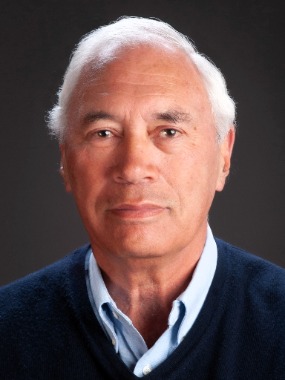Dr. Selwyn Katene, an academic and historian from Porirua, New Zealand, loves learning from the lives of those who have gone before him. He has researched and written histories of The Church of Jesus Christ of Latter-day Saints in New Zealand for decades.
According to Katene, understanding Latter-day Saint history “will help today’s New Zealanders connect with the sacrifices made by their forebearers, and define and build a stronger future for all.”
| Temple Square is always beautiful in the springtime. Gardeners work to prepare the ground for General Conference. © 2012 Intellectual Reserve, Inc. All rights reserved. | 1 / 2 |
Over the last few years Dr. Katene and Professor A. Keith Thompson have worked on a project called, “Build for Eternity: A History of The Church of Jesus Christ of Latter-day Saints in New Zealand.”
Katene and Thompson worked with 13 other scholars and writers as they addressed different aspects of Church history in New Zealand spanning 170 years.
For Katene, this is an attempt to “connect today’s members of the Church with their tupuna (the Māori word for ancestors).
“These ancestors are not distant figures; they’re close to us, not only present within temple walls but throughout our lives,” Katene said.
He says preserving the history of the Church and its members in New Zealand is very important to him. “It’s essential that we write our own narrative—for us, by us. This history belongs to our families and is of interest to all New Zealanders,” he says.
As Katene has conducted his research and written histories over the years, he has made several observations.

Selwyn-Katene
Dr. Selwyn Katene, Porirua, New Zealand.“First, faith—real unwavering faith in the Lord Jesus Christ—is crucial,” Katene said. “In times of uncertainty we must pause, reflect, and take stock of where we stand.
“Secondly, this faith-building process fortifies families and the ties with their tupuna, or ancestors, making them more resilient in the face of modern challenges.”
Katene said he became aware of the role of personal revelation in the lives of Church members in New Zealand—in the past and today. He takes much of his encouragement to write Church history from the faith-promoting stories passed on from his great-great-grandmother, Ngahuia Ripeka Chase.
“Back in 1886, my great-great-grandmother may not have held the priesthood, but she carried the Spirit of the Lord within her. The light of Christ illuminated her path,” he explained. “Through fervent prayer, she became so attuned to nature and the environment that it was second nature for her to be in tune with the Spirit of the Lord, and she could sense what was happening around her and anticipate future events.”
“This was a time before social media and email. Yet, when those Māori said something was going to happen, you’d better start planning because it would indeed happen,” Katene said.
"So, my passion lies in documenting our history and the contributions of our forebears to the growth of the Church, particularly here in New Zealand.
Katene said the early growth of the Church among the Māori people was remarkable, but not without its challenges. “The first 100 years was critical in terms of laying the foundation for the future.”
Katene refers to a “watershed moment” in Church history in New Zealand—the building of the Hamilton New Zealand Temple, the Church College of New Zealand, and the construction of chapels and other structures throughout New Zealand in the 1950’s and `60’s.
“Church members received abundant blessings at that time, but they also demonstrated the way forward.”
Katene hopes Church members and others will yearn for connections to the past, and to encourage all to look to the future with faith.
"I was inspired by Antoine de Saint-Exupéry, who once said: ‘If you want to build a ship, don’t drum up the men to gather wood, divide the work, and give orders. Instead, teach them to yearn for the vast and endless sea.’"
“Our legacy should be one that promotes the importance of Church history—a history that encompasses dedicated families, places and events, not just the institution itself,” Katene says.
“If your family is part of the Church, that’s our shared history.”
“Here in New Zealand, we must preserve it, write it down, and generously share that knowledge,” he continued. “Many of us hold valuable insights, and once we compile and document them, they should be disseminated widely, so people can be suitably uplifted.”
Read more about Dr Katene here.